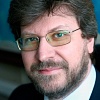One of the greatest novels of the 20th century, George Orwell's 1984, describes a macabre world where the line between war and peace, freedom and slavery, truth and lie is inexistent. Everything is determined according to rationality, served according to the needs. The author was horrified by the European reality of the 1930-40s: formation of totalitarian regimes in Germany and the USSR, which were pointed out as the foretype of the future in light of the deep crisis of the West.
Ideological totalitarianism turned out to be less durable than Orwell had feared. The dystopia, however, started gaining outlines where no one had expected. The drastic technological progress formed an omnipresent and all-pervading communication environment. Paradoxically, the absolute closeness and the absolute openness are characterized by one and the same effect: they create a dictatorship of information. When everything can be concealed or nothing can be hidden, we get another surprising, yet similar, result: the authenticity of information becomes dubious.
The difference is essential too. The closed totalitarian system has a clear center for mind control. In an open totalitarian one, the utter lack of it provokes a strive to structure the surrounding environment, to form a coordinate grid. And this is when methods as old as the world are employed, for there is nothing more clear for the human mind than self-esteem gained in contraposition to others, an antipode. In other words, an image of the enemy is needed to put everything in order.
In the years of the Cold War, everything was much simpler: ideological confrontation set a distinct line. But the 20th century in this aspect is more of an exception in world history. Never "before" have ideologies played such significant role, perhaps even decisive, in international relations, there would most likely never be anything like it "after". It was the nightmare of George Orwell, but in terms of the structural system of the world, it maintained unprecedented stability.
The 20th century was not only characterized by the triumph of ideology in the world politics, it was also their decline. By the end of the century, it was sort of established which of the ideologies was "the only veracious" (liberal). However, serious doubts about it were growing. At least in terms of its ubiquitous applicability. Howbeit, the formed vacuum began engulfing more traditional forms of an ideal organization, such as nationalism or religious identity. Both were certainly manifesting themselves in the age of globalization differently from the classic times.
Say, nationalistic self-identification in the context of global interdependence and intertwining searches for a new pillar, exploiting people's fear of the changing world and even referring to archaic and conventional images and notions. Societies claiming to be more socio-politically advanced, i.e. the West, are trying to overcome the tradition instead and shift to a new supranational and suprareligious quality.
Nevertheless, the problems of identity, culture in its broad sense take the central place in the political process. Wherever cultures differ, interpretations of events vary by nature. As a result, not only does an image of the enemy appear, depictions of the world become more discrepant. And the cause of that is not some ill will and premeditated propaganda (although they do take place occasionally), it is in the cardinally different cultural backgrounds. Ideologies were stapled more firmly, they were provided with a more solid methodology that could be understood and explained if necessary. Culture needs to be studied and perceived, which is not a very popular endeavor in international relations: actors behave projecting their own behavioral logic to the counterpart.
One very simple example. Let's say the Ukrainian story had absolutely sterile coverage lacking any bias (which is impossible in practice). Its interpretation would still differ, for example, in Russia and France, because the complexes of historical, cultural associations connected with the events are cardinally different. A Frenchman and a Russian would never perceive Ukraine identically. It is the objective reality.
Back to the communication world, the scale of the discrepancy goes up rapidly, the global space transforms into a gigantic magnifying glass. Since the field of emotions and visualizations is a lot less rationalized than even the field of ideological dogmas, the conflict becomes more acute and dangerous than it was in the years of the Cold War. No one today has a solution to that.
Source: Valdai Club




